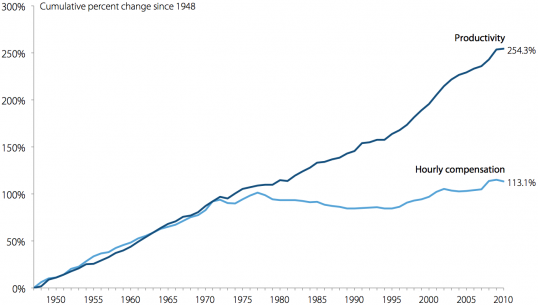basil_hayden wrote:If you smash your TV and internet connections, it mostly goes away.
Spanish Pipedream
--
@meier

basil_hayden wrote:If you smash your TV and internet connections, it mostly goes away.




Herr Meier wrote:My brain is clearly not big enough to understand it all.
Where will it end?


pstarr wrote: But who will farm out the farm work?


El_Producto wrote: What real benefit is there to getting rid of them?.


Long ago I naively thought that the computer revolution would mean the end of the paper industry. It seems we have not reached the pain-point - there still some trees standing.ennui2 wrote:My feeling is that when commuting costs hit a certain pain-point that corporate cultural inertia preventing telecommuting will break and you'll see a huge boom in telecommuting.
If everyone who could telecommute did, it would save a ton of wasted petroleum.


El_Producto wrote: a few fast food executives getting bigger houses and everything while hundreds of thousands lose their income.


radon1 wrote:automation results in higher overall employment.

But that would be AI, an intelligent entity equivalent to a human being. Essentially, we may consider that entity as gainfully employed on terms equivalent to human. How is it different from a human then? Not sure that it's worth going that far at this stage. It would give rise to all sorts of considerations beyond economic or technical. An employee is essentially is a center of responsibility, and the responsibility is assured by greed, fear, conscience, altruism, you name it. How you are going to assure responsibility in the intelligent entity is anyone's guess, difficult to speculate.Herr Meier wrote:
If I'd were to build a robot that can do EVERYTHING.
There's a large body of people that are only capable of simple mundane factory work.

radon1 wrote:(as I keep repeating) automation results in higher overall employment, not lower. It is impossible to lay off everyone due to automation.



ennui2 wrote:I don't believe it's possible for bots and AI to design their own replacements.


El_Producto wrote:Laying off all the workers though would probably be a big societal problem. Talk about the few profiting at the expense of the many though, a few fast food executives getting bigger houses and everything while hundreds of thousands lose their income. Kind of makes me angry to think about, you know? I'm not sure what can really be done to stop it though.

Pops wrote:Show us some evidence why this will continue past PO and you won't have to keep repeating yourself.
Along about '75 something definitely happened to decouple wages from productivity. Was it Disco?
While Japan continued to close the gap in income per capita between itself and the United States after the early 1970s, most scholars believe that large Japanese manufacturing enterprises had by and large become internationally competitive by the early 1970s. In this sense it can be said that Japan had completed its nine decade long convergence to international competitiveness through industrialization by the early 1970s.
In the 1970s, the sharp increase of Japan's exports of industrial products to the U.S.A. and Europe began to cause international friction. In 1971, the U.S.A. announced it would end the convertibility of the dollar into gold. In December 1971, Japan revalued the yen from 360 yen against the U.S. dollar, which had been maintained for 22 years, to 308 yen. In February 1973, Japan adopted a floating exchange-rate system.

Return to Open Topic Discussion
Users browsing this forum: No registered users and 28 guests